Clinical laboratories play a crucial role in modern healthcare by providing valuable diagnostic information to aid in patient care. Medical tests conducted in these labs help physicians diagnose and monitor various medical conditions, enabling them to make informed decisions about treatment. In this blog, we’ll explore the different types of medical tests offered by clinical labs, shedding light on their purposes and significance.
Top 7 Different Types of Medical Tests
Blood Tests
- Complete Blood Count (CBC): This common test assesses the overall health of a patient by measuring various components of their blood, including red and white blood cells, hemoglobin, and platelets.
- Basic Metabolic Panel (BMP): BMP measures essential electrolytes, glucose levels, and kidney function. It is one of the different types of medical tests that are often used for routine check-ups and to diagnose conditions like diabetes.
- Comprehensive Metabolic Panel (CMP): Similar to BMP, CMP includes additional tests to evaluate liver function and protein levels, providing a more comprehensive overview of a patient’s health.

Urinalysis
- Urinalysis: By analyzing a urine sample, clinicians can detect signs of kidney disease, urinary tract infections, diabetes, and other conditions. It involves assessing the color, pH, protein, glucose, and presence of bacteria in the urine.
Imaging Tests
- X-rays: X-rays use low doses of radiation to produce images of bones, organs, and tissues. These different types of medical tests are essential for diagnosing fractures, lung conditions, and dental problems.
- Computed Tomography (CT) scans: CT scans provide detailed cross-sectional images of the body, aiding in the detection of tumors, injuries, and internal abnormalities.
- Magnetic Resonance Imaging (MRI): MRI uses powerful magnets and radio waves to create detailed images of soft tissues, making it invaluable for diagnosing neurological, musculoskeletal, and cardiovascular issues.
Genetic Testing
- Genetic Testing: Clinical labs offer different types of medical tests including genetic tests which are invaluable to identify inherited diseases, assess the risk of certain conditions, and guide personalized treatment plans. Examples include BRCA testing for breast cancer risk and carrier screening for genetic disorders.
Microbiology Tests
- Culture and Sensitivity Testing: This method involves growing microorganisms from patient samples (e.g., blood, urine, or sputum) to identify the specific pathogen causing an infection and determine the most effective antibiotics for treatment.
- Viral Load Testing: Viral load tests are one among the different types of medical tests that measure the amount of virus (e.g., HIV or hepatitis C) in a patient’s blood, helping doctors monitor the progression of infections and evaluate the effectiveness of antiviral treatments.
Hormone Tests
- Thyroid Function Tests: These tests assess the thyroid gland’s activity by measuring hormone levels. They’re crucial for diagnosing thyroid disorders such as hypothyroidism and hyperthyroidism.
- Hormone Panels: Hormone panels which are one among the different types of medical tests help in evaluating various hormones in the body besides aiding in diagnosing conditions like hormonal imbalances, fertility issues, and adrenal disorders.
Cardiac Tests
- Electrocardiogram (ECG or EKG): ECGs record the heart’s electrical activity, helping diagnose arrhythmias, heart attacks, and other cardiac conditions.
- Cardiac Biomarker Tests: These tests measure specific proteins (e.g., troponin) released into the bloodstream during heart muscle damage, assisting in the diagnosis of heart disease.
What are the different types of lab tests?
There are various types of lab tests used to diagnose and monitor medical conditions, including:
1. Blood Tests: These include complete blood count (CBC), blood chemistry panels, and blood clotting tests.
2. Urine Tests: To check for various health markers, such as kidney function or drug use.
3. Imaging Tests: X-rays, CT scans, MRI, and ultrasound to visualize internal structures.
4. Microbiological Tests: For identifying infectious agents like bacteria and viruses.
5. Pathology Tests: Including biopsies and cytology examinations for cancer diagnosis.
Conclusion
To conclude, clinical laboratories offer a wide array of medical tests that play a pivotal role in diagnosing and managing various health conditions. From routine blood tests to advanced imaging and genetic analysis, these tests provide essential information for healthcare providers to make informed decisions about patient care. Understanding the different types of medical tests offered by clinical labs empowers patients to take an active role in their healthcare and fosters better collaboration between patients and healthcare professionals.
Read also Diagnostic Center in Pondicherry.



